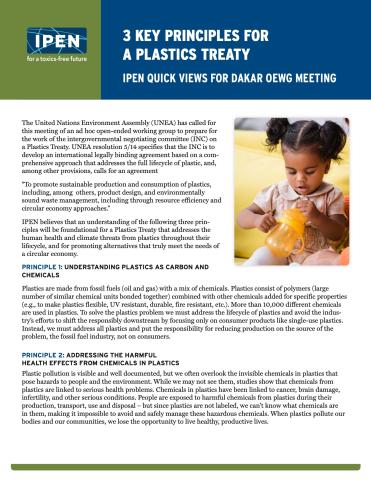3 Key Principles for a Plastics Treaty

IPEN Quick Views for Dakar OEWG Meeting
The United Nations Environment Assembly (UNEA) has called for this meeting of an ad hoc open-ended working group to prepare for the work of the intergovernmental negotiating committee (INC) on a Plastics Treaty. UNEA resolution 5/14 specifies that the INC is to develop an international legally binding agreement based on a comprehensive approach that addresses the full lifecycle of plastic, and, among other provisions, calls for an agreement
“To promote sustainable production and consumption of plastics, including, among others, product design, and environmentally sound waste management, including through resource efficiency and circular economy approaches.”
IPEN believes that an understanding of the following three principles will be foundational for a Plastics Treaty that addresses the human health and climate threats from plastics throughout their lifecycle, and for promoting alternatives that truly meet the needs of a circular economy.
Principle 1: Understanding plastics as carbon and chemicals
Plastics are made from fossil fuels (oil and gas) with a mix of chemicals. Plastics consist of polymers (large number of similar chemical units bonded together) combined with other chemicals added for specific properties (e.g., to make plastics flexible, UV resistant, durable, fire resistant, etc.). More than 10,000 different chemicals are used in plastics. To solve the plastics problem we must address the lifecycle of plastics and avoid the industry’s efforts to shift the responsibly downstream by focusing only on consumer products like single-use plastics. Instead, we must address all plastics and put the responsibility for reducing production on the source of the problem, the fossil fuel industry, not on consumers.
Principle 2: Addressing the harmful health effects from chemicals in plastics
Plastic pollution is visible and well documented, but we often overlook the invisible chemicals in plastics that pose hazards to people and the environment. While we may not see them, studies show that chemicals from plastics are linked to serious health problems. Chemicals in plastics have been linked to cancer, brain damage, infertility, and other serious conditions. People are exposed to harmful chemicals from plastics during their production, transport, use and disposal – but since plastics are not labeled, we can’t know what chemicals are in them, making it impossible to avoid and safely manage these hazardous chemicals. When plastics pollute our bodies and our communities, we lose the opportunity to live healthy, productive lives.
Principle 3: Recognizing that toxic chemicals make plastics incompatible with a circular economy
The toxic chemicals in plastics make them inherently incompatible with non-toxic, circular economic approaches. Recycling plastics is a myth marketed by the industry. Even though very few plastics are ever recycled, these recycled plastics pass hazardous chemicals uncontrollably to new products, exposing more people to harmful chemicals. Industry’s plan to burn plastic waste as fuel is even worse – because burning fossil fuel-based plastics produces even deadlier chemicals, magnifying the health threat and exacerbating climate change. We need immediate steps to significantly reduce production of plastics and a fundamental shift in our materials economy to replace them with safer, sustainable materials that promote a healthy, circular economic future.
IPEN is calling for a Plastics Treaty that:
- Protects health and the environment
- Ends the production and use of toxic chemicals in plastics
- Removes toxic impacts at all stages of the lifecycle of plastics
- Bans recycling of plastics containing hazardous chemicals
- Protects the public’s right to know about chemicals in plastics and information on plastic production and waste exports
- Charges plastic producers to finance the treaty
- Promotes safer sustainable materials for a toxics-free circular economy
- Curbs toxic and climate pollutants
IPEN Quick Views of the “Ad hoc open-ended working group (OEWG) to prepare for the Intergovernmental Negotiating Committee to end plastic pollution”
Resolution 5/14 from UNEA-5.2 that mandated the beginning of negotiations for a new legally binding instrument on plastics, required UNEP Executive Director to convene an ad hoc open-ended working group to prepare for the work of the intergovernmental negotiating committee to end plastic pollution. This meeting will be held from 30 May to 1 June 2022 in Dakar, Senegal in a hybrid format. These IPEN Quick Views highlight the priority outcomes from this meeting.
Useful links:
- Meeting documents
- Agenda
- Draft rules of procedure for the INC
- CIEL comparison table between Minamata rules of procedure and draft Plastics ICN rules of procedure
- IPEN views on global controls on plastics (in 7 languages)
- IPEN analysis: How the Resolution “End plastic pollution: Towards an international legally binding instrument” relates to chemicals and health (in 6 languages)
- IPEN reports: Plastic poisons the circular economy
The following outcomes should be expected from the meeting:
- a recommendation on the Rules of Procedure for the intergovernmental negotiating committee
- identification of candidates for the Bureau of the intergovernmental negotiating committee
- recommendations for the timeline of the intergovernmental negotiating committee meetings and the sequencing of work for the intergovernmental negotiating committee process
- a request to the UNEP secretariat to prepare draft elements and proposed options to structure the Treaty, for consideration by the intergovernmental negotiating committee at its first session.
Rules of procedure
- Member States should support process that ensures open, inclusive, and transparent participation. This includes recognizing the importance of in-person participation of public interest organizations from all regions of the world and ensuring financial support to organizations from low- and middle-income countries in the negotiation of the Treaty
- Member States should seek a participation that is open and unrestricted
Treaty elements and structure
- Member States should ensure that the request to the secretariat on the draft elements and structure of the treaty includes considerations on the human health impacts of plastics and on chemical ingredients of plastics.
- The request to the secretariat should consider the scientific evidence of the harm caused by plastics, including on human health, the role of chemicals used in plastics and their impacts on the lifecycle of plastics
Conference variant


